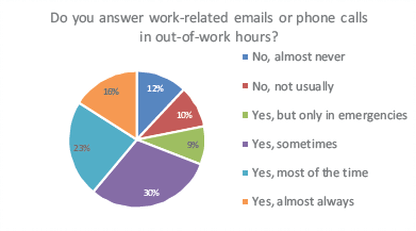According to the HSE (Health and Safety Executive), in 2015/16 over 480,000 people in the UK reported that work-related stress was making them ill. This amounts to nearly 40% of all work-related illness. Yet many employees are reluctant to talk about stress at work. There is still a stigma attached to stress and people still think they will be seen as weak if they admit they are struggling. But stress is not a weakness and can affect anyone at any level of an organisation.We originally talked about this important and sometimes overlooked subject in a blog last December, as its international stress awareness week we wanted to revisit the subject.
In 2017, we saw impressive progress made in challenging the stigma surrounding mental health. The Royal Family have been promoting the Heads Together Campaign – an initiative which strives to change the conversation on mental health. We have also seen the subject become a popular theme in discussions both in politics and the mass media. Despite the fact that mental health appears to be slowly moving up the national agenda, the issue of everyday stress, including its prevalence and impact, is still largely being overlooked.
Stress in itself has been shown to have a negative impact, both on individual life expectancy and on quality of life. However, it has also been shown to be one of the main catalysts in developing serious mental health conditions and contributes towards their severity (Ingram and Luxton, 2005). Therefore, if we stand any chance of preventing mental health difficulties in the future, it is paramount that more attention is given to the topic of stress and how it can be prevented.
The average person in the UK spends around 12 years of their life at work. As well as taking up a significant part of our lives, the experience of work can become a major source of stress for many people. It is therefore important that an employer takes steps to tackle the work-related causes of stress in its organisation and encourages staff to seek help at the earliest opportunity if they begin to experience stress.
Firstly, what is stress?
Stress is defined as the ‘adverse reaction people have to excessive pressures or other types of demand placed on them’. Most staff benefit from a certain amount of pressure in their work. It can keep them motivated and give a sense of ambition. However, when there is too much pressure placed on them, they can become overloaded. Stress can affect the health of staff, reduce their productivity and lead to performance issues.
Stress is not an illness, but the psychological impact can lead to conditions such as anxiety and depression. Stress, anxiety and depression can also increase the risk of conditions like heart disease, back pain, gastrointestinal illnesses or skin conditions.
What are the main causes stress?
There can be a variety of causes of stress. For example, financial problems, difficulties in personal relationships or moving to a new house can all cause stress. Work can also cause stress. The HSE (Health and Safety Executive) has identified the six primary causes of work-related stress to be:
- The demands of the job – staff can become overloaded if they cannot cope with the amount of work or type of work they are asked to do.
- Amount of control over work – staff can feel disaffected and perform poorly if they have no say over how and when they do their work.
- Level of support from managers and colleagues – levels of sickness absence often rise if staff feel they cannot talk to managers about issues troubling them.
- Relationships at work – a failure to build relationships based on good behavior and trust can lead to problems related to discipline, grievances and bullying.
- How a role fits within the organisation – staff will feel anxious about their work and the organisation if they don’t know what is expected of them and/or understand how their work fits into the objectives of the organization.
- Change and how it is managed – change needs to be managed effectively or it can lead to huge uncertainty and insecurity.
78% OF PEOPLE REPORTED THAT THEY ANSWERED EMAIL AND PHONE OUTSIDE WORKING HOURS

In a recent ISMA survey a staggering 78% of individuals said that they answered work-related email and phone calls outside working hours. The remaining 22% of individuals who did not act like this consisted of people who did not feel the need to communicate about work outside of working hours, and those who were unable to do so, due to the nature of their employment.In the light of this evidence, it is not surprising that 61% of individuals reported that they did not think their employer was taking enough action to prevent their stress levels getting too high.
Why is it key for employers try to reduce the causes of stress at work?
- Firstly, reducing work-related stress can be hugely beneficial to an employer:
- Making staff healthier and happier at work
- Improving performance and making staff more productive
- Reducing absence levels
- Reducing workplace disputes
- Making the organisation more attractive to job seekers
- Secondly, an employer has a legal obligation to ensure the health, safety and welfare of its employees. As part of this, an employer must conduct risk assessments for work-related stress and take actions to prevent staff from experiencing a stress-related illness because of their work.
“Any plan developed to tackle mental health needs will be empty and meaningless if it doesn’t factor in the escalating problem of work-related stress. We urge employees and employers alike to end the stigma of work-related stress by ‘speaking up and speaking out about stress’ and raising its profile in the workplace. ISMA believes that, by transitioning our workplaces into safe spaces where employees’ emotional is also valued, we can start to find collaborative and creative solutions to stress and mental health problems. This will have a positive effect not only on productivity but also on the general mental well-being of the nation.” well-being
CAROLE SPIERS FISMA, MIHPE, CHAIR, ISMA UK
So what steps can be taken to reduce work-related stress?
A risk assessment can be conducted, if this identifies areas where the organisation is performing poorly, an employer should work with its staff to agree realistic and practical ways to tackle it.
An HR Consultant could be used to ensure negotiating arrangements are put in place or certainly followed so that staff and/or their representatives can contribute their views.
An action plan should be developed that will show:
- What the problem is
- How it was identified
- The proposed solution/s
- Actions to be taken to achieve the solution/s
- Dates by which each action should be achieved
- How staff will be kept informed on progress
- A date to review the plan and see if it has achieved its aim
Once solutions have been implemented, the review should check that agreed actions have been done and evaluate how effective these have been. The views of staff, and data collected on employee turnover, sickness absence, and productivity, can help compare the organisation against how it was before the action plan was implemented.
An employer will then need to consider what, if any, further action is needed.
How can you spot when staff may be experiencing stress?
While identifying work-related risks and taking preventative measures should help minimize stress for most staff, it may still affect some team members due to issues inside or outside of the workplace. Managers should be prepared to help and support a team member experiencing stress.
Although training on stress can be very useful, a manager should not be expected to be an expert.It is important to never make assumptions, but signs that a team member may be stressed include:
Changes in the person’s usual behavior, mood or how they interact with colleagues
Changes in the standard of their work or focus on tasks
The person may appear tired, anxious or withdrawn and reduced interest in tasks they previously enjoyed
Changes in appetite and/or increase in smoking and drinking alcohol
An increase in sickness absences and/or turning up late to work.
Talking to another team member who may be experiencing stress
Where a manager thinks a team, member may be experiencing stress, they should approach the matter quickly this is because without talking to the team member, it is impossible to know what is affecting them and therefore a consistent approach should be taken.
Organisations should actively encourage staff to talk to their manager if they think they are becoming unwell. Creating a working environment that proactively supports staff who become unwell will make it easier for staff to tell their manager if they are experiencing stress.
If a team member does approach their manager to advise they are experiencing stress, the manager should:
Move the conversation to a private space, where they will not be disturbed (if not already somewhere appropriate)
Thank the team member for coming to them and letting them know
Be patient and allow them as much time as they need to talk about it
Remain focused on what they say
Be open minded
Try to identify what the cause is
Think about potential solutions.
If the cause of stress relates to their relationship with their manager, or other team members, it may be beneficial to involve an HR Consultant or your HR Department Human if the organisation has one, or a more senior manager and allow the team member to have a companion (such as a work colleague or trade union representative) at any meetings.
How can you support a team member experiencing stress?
Where it is possible to identify a work-related problem, a manager (in discussion with the team member) should consider what support or changes would rectify the situation. They could be temporary or permanent. Usually small, simple changes to working arrangements or responsibilities will help ease pressures affecting the team member.
It may take a number of informal meetings with the team member to agree the best way forward. Some changes may also require authorisation from senior management, HR or the owner of the business. A manager should explain if they believe a potential change may require authorisation and when an answer should be received. If authorisation is refused, a manager should clearly explain the reasons why this was not practicable and try to find an alternative solution.
If changes are agreed and made, a manager should also agree with the team member what their work colleagues will be told. Even if the cause of stress may not be work-related, changes to the team member’s working arrangements may help reduce some of the pressure they are experiencing. For example, temporarily changing their working hours may reduce stress caused by caring responsibilities for an ill-relative. You should also monitor the situation
A manager should regularly check on how a team member experiencing stress is feeling and whether any changes in place are still needed and/or working as required. This could be through planned one-to-one meetings or through informal chats in the workplace.
Even once the team member is able to resume their normal working arrangements, their manager should continue to monitor their health and offer support where necessary.
We can visit your organisation to help you understand what needs to be done to address a range of issues related to stress management and the identification of critical issues in your workplace and then work with you to develop practical solutions. We can also offer a range of training courses to help managers in your organisation.
For more information regarding Stress Management in the workplace and to learn how we can help through Business Coaching and NLP in your organisation, feel free to call us on 01243 607357, email [email protected] or contact us via our confidential web form



